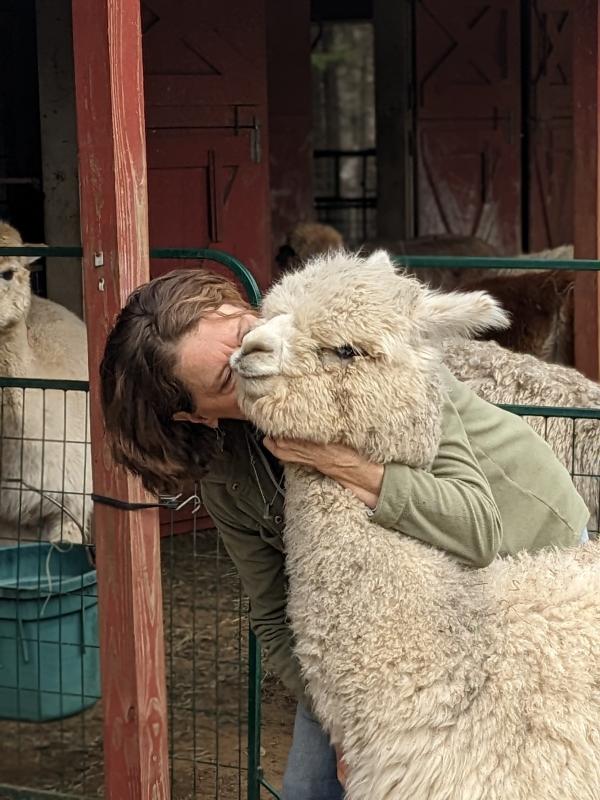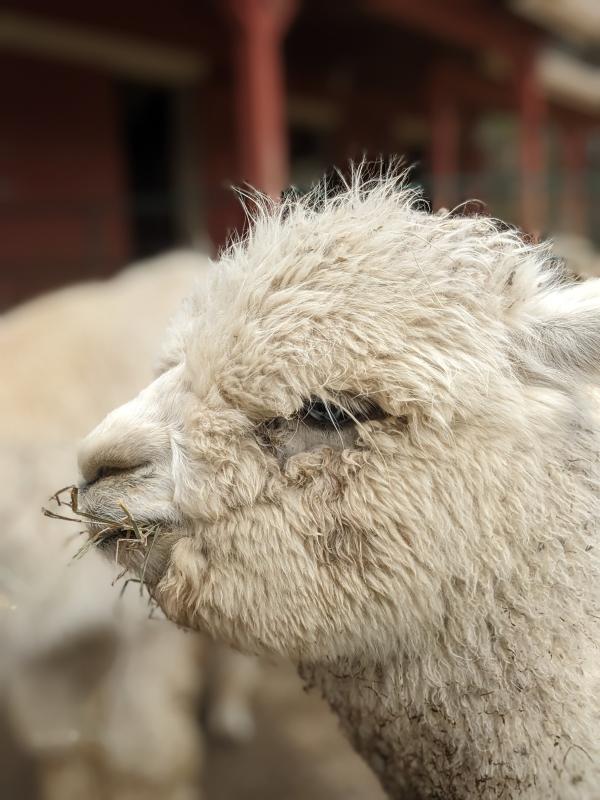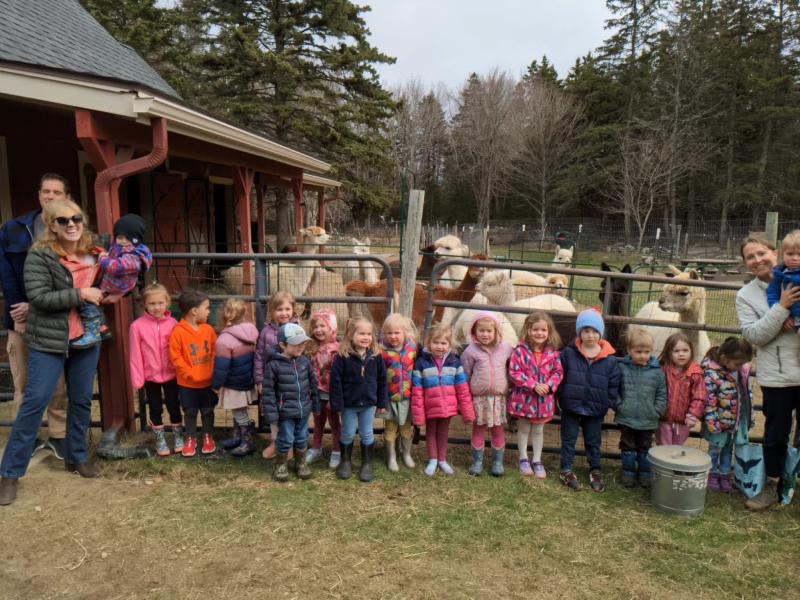Wiscasset preschoolers meet their ‘adopted’ alpaca in Southport
 Sheepscot Valley Children’s House preschool class from Wiscasset sings and signs a friendship song to the their adopted” alpaca Theodora on April 11 in Southport. CANDI JONETH/Boothbay Register
Sheepscot Valley Children’s House preschool class from Wiscasset sings and signs a friendship song to the their adopted” alpaca Theodora on April 11 in Southport. CANDI JONETH/Boothbay Register
 Theodora and Anne Gobes, farm owner and alpaca caretaker. CANDI JONETH/Boothbay Register
Theodora and Anne Gobes, farm owner and alpaca caretaker. CANDI JONETH/Boothbay Register
 Students feed Theodora shredded carrots. CANDI JONETH/Boothbay Register
Students feed Theodora shredded carrots. CANDI JONETH/Boothbay Register
 CANDI JONETH/Boothbay Register
CANDI JONETH/Boothbay Register
 Theodora. CANDI JONETH/Boothbay Register
Theodora. CANDI JONETH/Boothbay Register
 Preschoolers take turns feeding Theodora. CANDI JONETH/Boothbay Register
Preschoolers take turns feeding Theodora. CANDI JONETH/Boothbay Register
 Joan Chatterton’s (left) Sheepscot Valley Children’s House preschool class from Wiscasset tours Cape Newagen Alpaca Farm in Southport and meets their “adopted” alpaca, Theodora. CANDI JONETH/Boothbay Register
Joan Chatterton’s (left) Sheepscot Valley Children’s House preschool class from Wiscasset tours Cape Newagen Alpaca Farm in Southport and meets their “adopted” alpaca, Theodora. CANDI JONETH/Boothbay Register
 A parent connects with Theodora. CANDI JONETH/Boothbay Register
A parent connects with Theodora. CANDI JONETH/Boothbay Register
 Attending parents enjoy the alpacas. CANDI JONETH/Boothbay Register
Attending parents enjoy the alpacas. CANDI JONETH/Boothbay Register
 Sheepscot Valley Children’s House preschool class from Wiscasset sings and signs a friendship song to the their adopted” alpaca Theodora on April 11 in Southport. CANDI JONETH/Boothbay Register
Sheepscot Valley Children’s House preschool class from Wiscasset sings and signs a friendship song to the their adopted” alpaca Theodora on April 11 in Southport. CANDI JONETH/Boothbay Register
 Theodora and Anne Gobes, farm owner and alpaca caretaker. CANDI JONETH/Boothbay Register
Theodora and Anne Gobes, farm owner and alpaca caretaker. CANDI JONETH/Boothbay Register
 Students feed Theodora shredded carrots. CANDI JONETH/Boothbay Register
Students feed Theodora shredded carrots. CANDI JONETH/Boothbay Register
 CANDI JONETH/Boothbay Register
CANDI JONETH/Boothbay Register
 Theodora. CANDI JONETH/Boothbay Register
Theodora. CANDI JONETH/Boothbay Register
 Preschoolers take turns feeding Theodora. CANDI JONETH/Boothbay Register
Preschoolers take turns feeding Theodora. CANDI JONETH/Boothbay Register
 Joan Chatterton’s (left) Sheepscot Valley Children’s House preschool class from Wiscasset tours Cape Newagen Alpaca Farm in Southport and meets their “adopted” alpaca, Theodora. CANDI JONETH/Boothbay Register
Joan Chatterton’s (left) Sheepscot Valley Children’s House preschool class from Wiscasset tours Cape Newagen Alpaca Farm in Southport and meets their “adopted” alpaca, Theodora. CANDI JONETH/Boothbay Register
 A parent connects with Theodora. CANDI JONETH/Boothbay Register
A parent connects with Theodora. CANDI JONETH/Boothbay Register
 Attending parents enjoy the alpacas. CANDI JONETH/Boothbay Register
Attending parents enjoy the alpacas. CANDI JONETH/Boothbay Register
Preschool students at Sheepscot Valley Children’s House in Wiscasset got to meet their virtually “adopted” baby alpaca, Theodora, April 11 at Cape Newagen Alpaca Farm (CNAF). Shortly after Theodora’s birth last August, Lead Preschool Teacher Joan Chatterton of Southport devised an emergent curriculum for her class of 3-year-olds that follows the alpaca’s growth and development.
For the past seven months, students have gotten monthly farm updates on Theodora’s height, weight, vaccinations, diet and developmental stages. Until now, students had seen photos and watched videos of Theodora, with much anticipation of meeting her. At one point, Theodora and two students were the same weight, but Theodora quickly outpaced the preschoolers. Students also showed sympathy during vaccinations, noting they get shots too.
Theodora is a cria, a baby alpaca, explained one student.
Theodora is one of three crias born last summer. She is white with blue eyes, and she is deaf. “The white fur and blue eyes combination is sometimes associated with deafness,” said Anne Gobes, farm owner and alpaca caretaker. The blue-eyed white (BEW) phenotype, associated with reduced pigmentation, is a common trait in alpacas and does not pose a concern in a herd situation, according to a 2012 study published by Oxford University Press. Chatterton’s students learned about deafness and, when they met Theodora, they sang her a friendship song in sign language.
Students shredded carrots as a treat for Theodora, who eats a daily combination of grains and hay, and still nurses from her mother, Juliana. “Alpacas have a split lip, and no upper teeth. This helps them pull grass while leaving roots intact,” said Gobes as she pulled Theodora’s mouth open to show the students her lips. Their bottom teeth grow continually.
Three generations of Theodora’s line live at the farm. Students met Theodora’s mother and grandmother. The full herd has eight males and 18 females.
“Nature is by far one of the best themes to work with in the classroom,” said Chatterton. “I wanted to find something in our neighborhood that we could track over time. Something meaningful for 3-year-olds. And we will continue to track through June, including Theodora’s first haircut in May.”
“I’m letting them rest and reflect on their farm visit today and then we’ll make a book of their story,” she said. “It’s always fascinating to see what they take away from the experience.”
As part of the emergent curriculum model, Chatterton branches off the main theme of Theodora into other learning, such as sign language; comparing and contrasting Theodora’s development to their own; and about raising babies. “Babies were a big theme. A couple of students had baby sisters born during this time,” she said. “We talked about taking care of babies, we even had baby dramatic plays.” Students discussed farm life, made alpaca art, learned the difference between llamas and alpacas, and made Theodora finger puppets over the holidays. With the yarn given to them during the farm visit, students will make bird nests and other crafts.
Chatterton has over 30 years’ experience in education, and Gobes is a retired school administrator. Both spoke of the educational value students receive when connecting their learning to a real-world situation like the farm.
The farm began in 2011 and opened to the public in 2015, by reservation. The farm offers tours, alpaca treks on shoreline and woodland trails, and classes in peg looming (participants make their own alpaca fiber rugs), farm 101, and alpaca husbandry.
New this year, the farm offers a program for veterans and first responders every Thursday from 1 to 2:30 p.m. beginning May 11. “We have noticed over the years the joy and calming effect our alpacas have had on us and our visitors. We want to give back to our community and share the alpaca experience with veterans and first responders,” Gobes wrote. “This program is a collaboration between our farm and the Southport Memorial Library to show our appreciation and to say thank you for those who have served and continue to serve our country and community! The library offers a coffee and snack hour from 2:30 to 3:30 p.m. We would like to provide you an opportunity and outdoor space to relax on our farm and enjoy some camaraderie at our local library.”






































